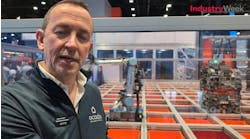The healthcare supply chain for devices and implantable wastes $5 billion.
Cardinal Health is addressing this issue by opening a Healthcare Supply Chain Innovation Lab. The research and development lab will employ an Internet of Things (IoT) approach. Much of healthcare’s IoT focus has centered on patient monitoring applications. This includes developing new solutions that will accelerate the transfer and analysis of big data and support real-time decision making on issues such as consumption and impending product expiration.
The new, 20,000 sq. ft. lab located in Concord, Mass., will serve as a hub for Cardinal Health to explore innovative approaches, such as smart sensors and near-field communication, to bring creative, acute care-centered technologies to some of health care’s most challenging issues.
“Building on existing automated cloud-based supply chain solutions, our vision is to create a level of efficiency and connectivity that will transform the healthcare supply chain from a source of savings into a strategic asset that can significantly reduce the total cost of care,” says Jean-Claude Saghbini, general manager for Cardinal Health Inventory Management Solutions.
The new center comprises hardware design, solutions testing laboratories as well as a Customer Experience Center, where visitors can interact with integrated solutions and provide feedback on technologies and services in the development stages. The team aims to develop new solutions that will accelerate the transfer and analysis of big data and support real-time decision making on issues such as consumption and impending product expiration.
The company is expanding its automated inventory management offerings and solutions for challenging processes related to procedural areas, such as the Operating Room. Its portfolio of inventory management solutions are currently used to track products in more than 2,700 hospital locations and 68 distribution locations in 41 countries.



